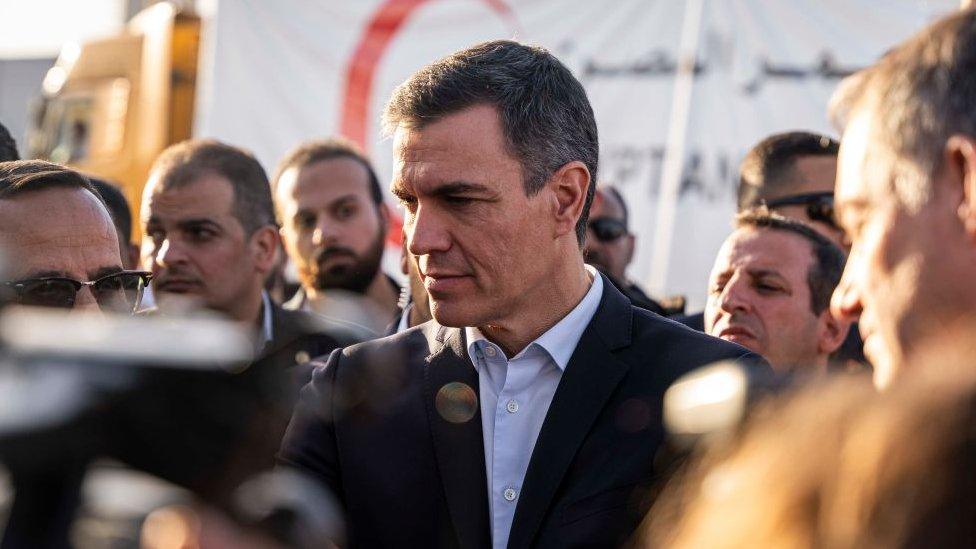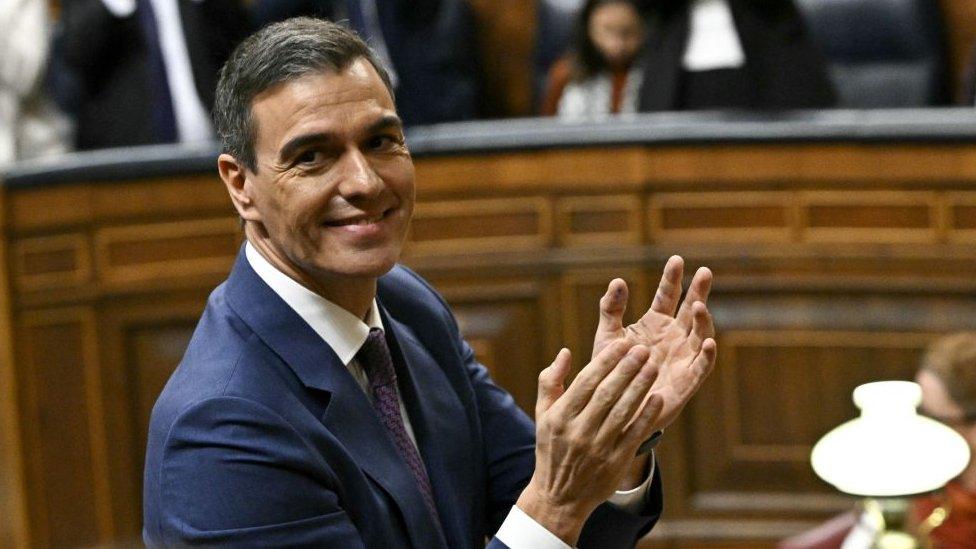Israel recalls ambassador in war spat with Spain PM Pedro Sánchez
- Published

Spanish Prime Minister Pedro Sánchez has deepened a diplomatic row with Israel after he said he had "serious doubts that Israel is complying with international humanitarian law".
His comments came days after he accused Israel of "indiscriminate killing of Palestinians" during its military operation in the Gaza Strip.
Israel has condemned his latest remarks as outrageous.
Israel says it aims to eliminate Hamas following its deadly attack on Israel.
At least 1,200 people were killed and more than 240 taken hostage as militants broke through the border fence between Israel and Gaza on 7 October.
Since then, more than 15,000 Palestinians have been killed during Israel's retaliation, the Hamas-run health ministry says.
For the second time in a week, Spain's ambassador to Israel was summoned for a rebuke.
"Israel is acting, and will continue to act, according to international law, and will continue the war until all the hostages are returned and Hamas is eliminated from Gaza," Israeli Foreign Minister Eli Cohen posted on X.
In response to what he called the latest "baseless accusations" by the Spanish leader, Mr Cohen said he had decided to recall Israel's ambassador to Madrid, Rodica Radian-Gordon, for consultations.
Mr Sánchez won a new term as prime minister only two weeks ago but he has become one of the most outspoken critics among EU leaders of Israel's response to the Hamas attacks on 7 October. His left-wing government is made up of his Socialist party, the left-wing Sumar alliance and pro-independence Catalans.
Ahead of last week's visit to Israel and the West Bank, he told parliament that his new government would work both in Europe and Spain to recognise a Palestinian state. Spain currently holds the EU presidency.
He then travelled to Israel with Belgian Prime Minister Alexander De Croo, telling Prime Minister Benjamin Netanyahu that while he defended Israel's right to defend itself, the number of Palestinian casualties was "truly unbearable".
Israel accused the two prime ministers of failing to place "full responsibility for the crimes against humanity committed by Hamas", adding that their "false claims... give support to terrorism".
Both countries' ambassadors were summoned for a reprimand. Spain's foreign minister rejected the Israeli accusations and in turn summoned Israel's ambassador.
On his return to Spain, Mr Sánchez was criticised by domestic political opponents for giving "classes in morality". Madrid's centre-right regional leader Isabel Díaz Ayuso said that his "embarrassing" position was creating a wall separating Spain from Israel, US and the West.
His latest intervention, during an interview with Spanish public broadcaster TVE, was derided by the Israeli prime minister's office for coming hours after Hamas gunmen shot dead three Israelis at a crowded bus stop on the outskirts of Jerusalem. The attackers got out of a car on a highway and opened fire with a rifle and a pistol.
The Spanish prime minister said the footage from Gaza of people dying, especially boys and girls, was "not acceptable" and he repeated his belief that a solution to the crisis required "recognition of the Palestinian state". He said it was in Europe's interest to address "out of moral conviction".
"Friendly countries also have to tell each other the truth," he insisted.

More on Israel-Gaza war
Follow live: Latest updates
Explained: Who are the hostages released from Gaza?
In Gaza: Nearly 100,000 buildings damaged
Israel-Gaza briefing: When truce ends, the decisive next phase of war begins
History behind the story: The Israel-Palestinian conflict

Related topics
- Published16 November 2023
